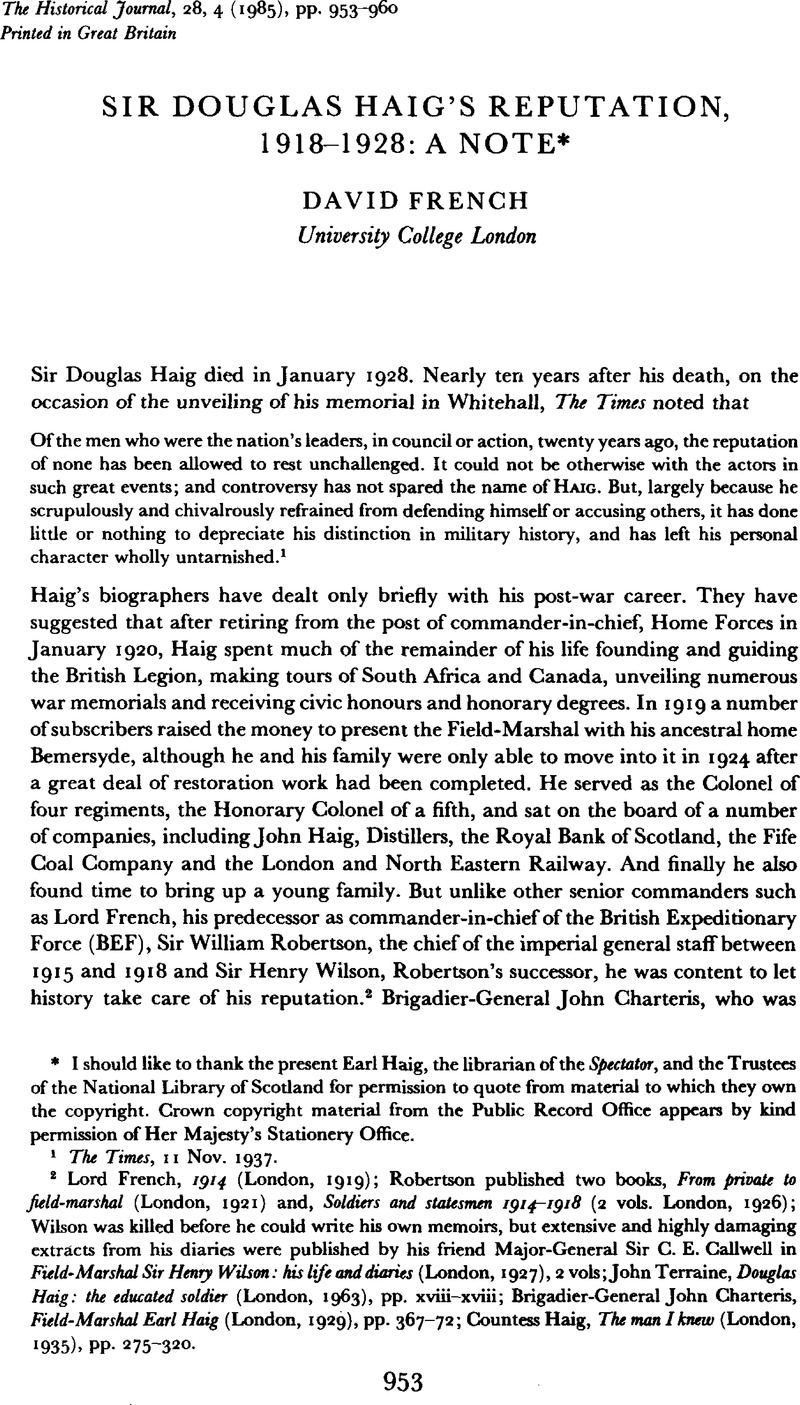Published online by Cambridge University Press: 11 February 2009

1 The Times, 11 Nov. 1937.
2 Lord French, 1914 (London, 1919); Robertson, published two books, From private to field-marshal (London, 1921)Google Scholar and, Soldiers and statesmen 1914–1318 (2 vols. London, 1926)Google Scholar; Wilson was killed before he could write his own memoirs, but extensive and highly damaging extracts from his diaries were published by his friend Major-General SirCallwell, C. E. in Field-Marshal Sir Henry Wilson: his life and diaries (London, 1927), 2 volsGoogle Scholar; Terraine, John, Douglas Haig: the educated soldier (London, 1963), pp. xviii–xviiiGoogle Scholar; Charteris, Brigadier-General John, Field-Marshal Earl Haig (London, 1929), pp. 367–72Google Scholar; Haig, Countess, The man I knew (London, 1935). pp. 275–320Google Scholar.
3 Charteris, , Haig, pp. 374–5Google Scholar.
4 Jenkins, Roy, quoted in the Guardian, 19 05 1983Google Scholar; Clark, Alan, The Donkeys (New York, 1962)Google Scholar.
5 Holmes, R., The little Field-Marshal: Sir John French (London, 1981), pp. 359–61Google Scholar.
6 French, 1914, p. 6; Holmes, , The little Field-Marshal, pp. 327–34Google Scholar.
7 Haig to the Secretary of the War Office, 4 April 1919; Boraston papers, Imperial War Museum, London, 71/13/2.
8 Haig to Haldane, 4 Aug. 1914; Haldane papers, National Library of Scotland, Edinburgh, 5910.
9 Secretary's notes of a War Council held at 10 Downing Street, August 5, 1914; Public Record Office, London, CAB. 42/1/2.
10 Haig diary, 30 Jan. 1916, National Library of Scotland, Edinburgh, Acc. 3155/104; the most recent account of Haig's relations with Lloyd George is Woodward, D. R., Lloyd George and the generals (London1, Newark and Toronto, 1983)Google Scholar.
11 Haig diary, 17 Sept. 1916, Haig papers, Acc. 3155/108; Haig to L. Rothschild, 1916, Haig papers, Acc. 3155/214A.
12 Blake, R., The private papers of Douglas Haig, 1914–1919 (London, 1952), pp. 300–1Google Scholar.
13 The most recent discussion of this question is Woodward, D. R., ‘Did Lloyd George starve the British army of men prior to the German offensive of 21 March 1918?’ Historical Journal, XXVII, 1, (1984), 241–52CrossRefGoogle Scholar; see also Maurice, Nancy (ed.), The Maurice case: from the papers of Major-Gerural Sir Frederick Maurice (London, 1972)Google Scholar.
14 The censored dispatch was published as a supplement to the London Gazette of 21 Oct. 1918.
15 Blake, , Private papers, p. 346Google Scholar.
16 Boraston, Lieutenant-Colonel J. H. (ed.), Sir Douglas Haig's despatches (December 1915–April 1919) (London, 1919/1979Google Scholar with a foreword by John Terraine). The censored passages can be found in Boraston MSS, 71/13/2, file marked ‘Slips for dispatches’.
17 Haig to Boraston, 9 Aug. 1920, Boraston MSS, 71/13/3.
18 Operations on the Western Front 1916–18, 30 Jan. 1920, Haig papers 3155/213A.
19 Jeffrey, K. and Hennessey, P., States of emergency: British governments and strikebreaking since 1919 (London, 1983), pp. 1–26Google Scholar; Ward, S. R., ‘Intelligence surveillance of British ex-servicemen, 1918–20’, Historical Journal, XVI, 1 (1973), 179–88CrossRefGoogle Scholar.
20 Haig to Boraston, 21 June 1921; see also Haig's address written by Boraston and given to the British Legion on 8 Nov. 1922. Both these references are in Boraston MSS, 71/13/3.
21 Haig to Boraston, 23 June 1921, Boraston MSS, 71/13/3.
22 G. A. B. Dewar to J. St Loe Strachey, 15 Nov. 1922, St Loe Strachey papers, House of Lords Record Office, London, S/5/4/2.
23 Dewar to Strachey, 10 Nov. 1922 and 26 Dec. 1922, Strachey papers, S/5/4/2.
24 Dewar, George A. B. assisted by Boraston, Lieut-Col. J. H., Sir Douglas Haig's command: December 19, 1915, to November 11, 1918 (London, 1922), 1, 4–10Google Scholar.
25 Dewar to Mr Atkins, and enclosure, 18 Oct. 1922, Strachey papers, S/5/4/2.
26 Haig to Boraston, 22 Nov. 1922, Boraston MSS, 71/13/3.
27 Haig to Sir James Edmonds, 26 Jan. 1923, P.R.O. CAB. 45/183.
28 Haig to Boraston, 22 April 1927, Boraston MSS, box 71/13/2; Prior, Robin, Churchill's World Crisis as history (London and Canberra, 1983), pp. 261–71Google Scholar.
29 Haig to Edmonds, 20 Feb. 1927, P.R.O. CAB. 45/183.
30 Clive Wigram to Boraston, 15 and 17 Mar. 1928, Boraston MSS, 71/13/3.